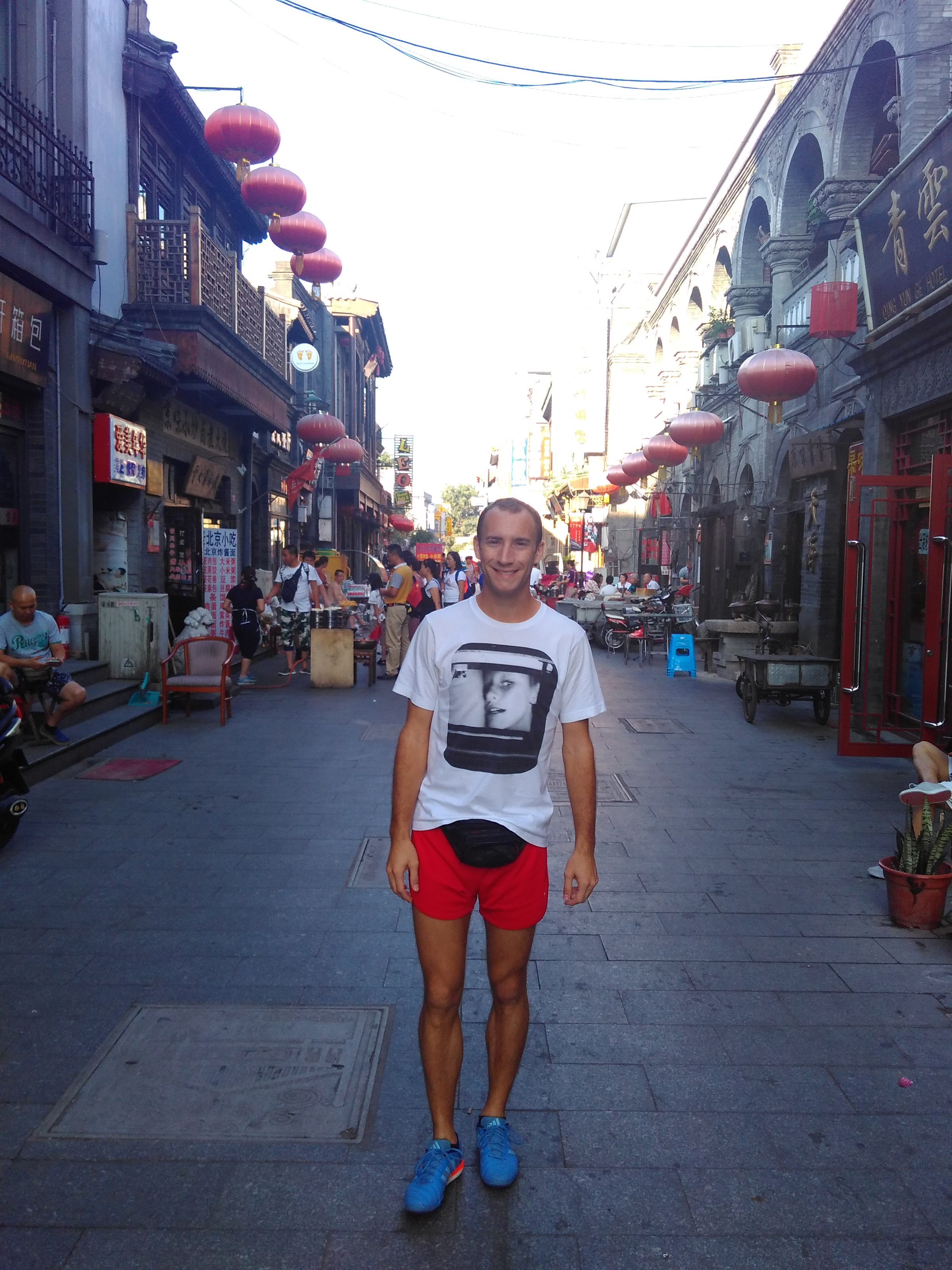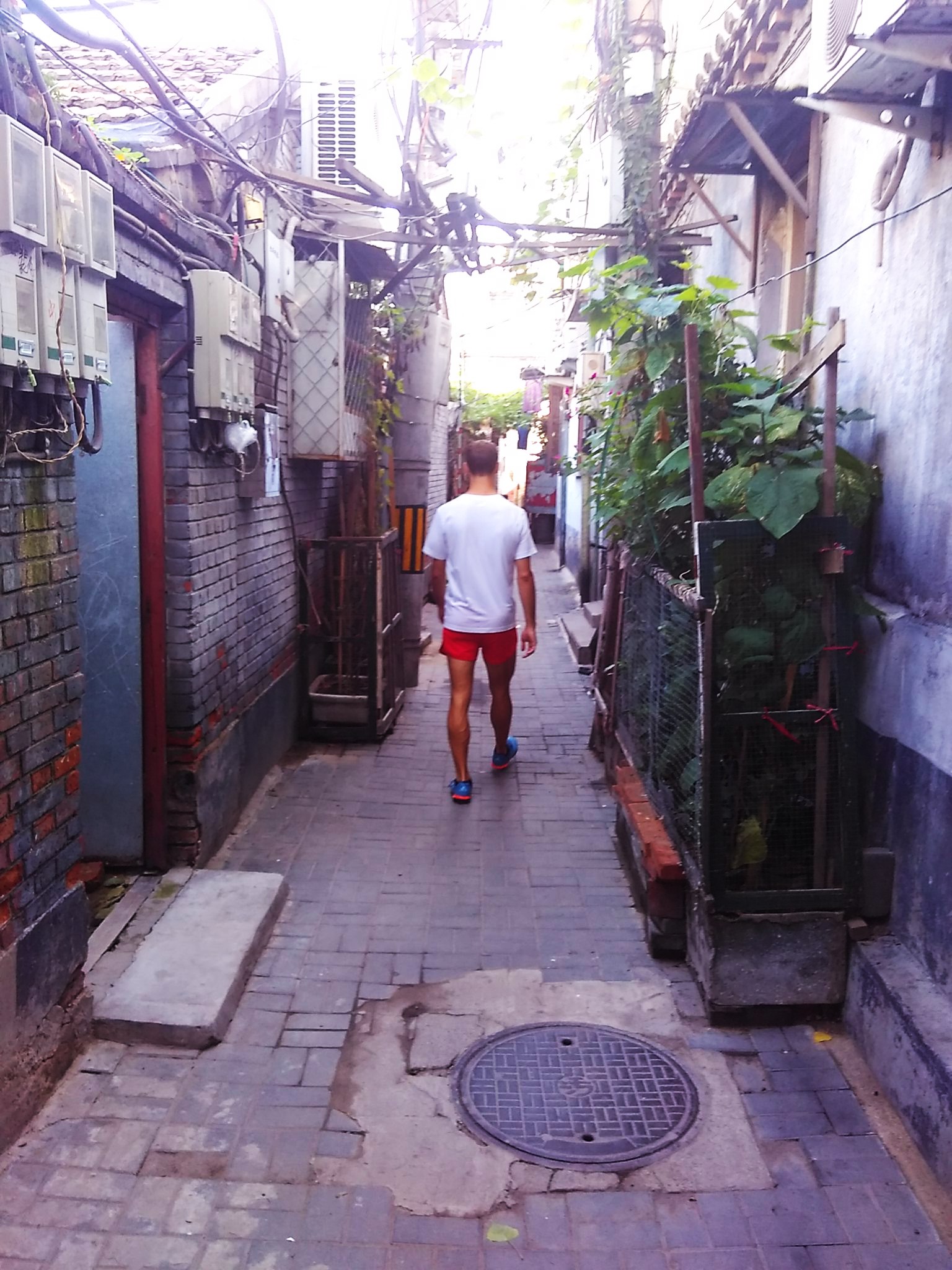BEIJING, CHINA
2016-09-12, 11:27, JASON
BUDGET, STAY: LEO HOSTEL
As a small note, for those readers that can read Chinese, the text will be displayed in Simplified characters to keep with the country's language norm.
For our cross-continental journey, we would be going to our friend Stephanie's wedding based in Denver. Buying the flights was a headache, but we mapped out our initial route: Singapore-Beijing Layover (Go in)-Los Angeles Layover-San Francisco, stay a few days-Denver, stay a few days-Los Angeles Layover-Beijing Layover-Singapore. We were able to escape the airport on a 72 hour transit visa into Beijing. The queues were long, many people were filing into the capital city. Foreigners and locals alike.
The last time I was in Beijing was 2005 to visit my grandmother. If anyone knows anything about Chinese development, it's that everyday the city is changing. Some new shop closing down and another replacing it, another family being evicted and one moving in, and at an unprecented rate. That's what it is, it's the pace. Things just move fast here - development, people, politics. And you feel it.
We hopped on from the airport connector train that connected us to the local metro station. Prior to that, we had heard stories of the awful pollution that Beijing had to 'offer' us, but to our delight and surprise the sky was bright blue. I hadn't seen a sky that blue since my days in California (which, strangely enough, we were en-route to). There wasn't a cloud in sight, not a hint of pollution, and the sun shone at a comfortable degree as it made its way down for the day. 17:00, and we were finally off on our first leg. Beijing, the historical city. The trian ride took us through the outskirts of the airport which, I find converge in terms of landscape for most cities. It's rural, not much development around it, but that makes sense as you don't want airtraffic waking neighbors up 24/7. The process to get on the train is incredibly efficient. Two tickets, one way. The man scans some card, the machine doles out two tickets, and we were on our way. The wait for the train was no more than 3 minutes. The platform was not crowded. You would not have believed that this was a city of 11 million people.
As the train arrived, a small boy had his face stuck looking out the window. He had short cropped hair and small eyes stuck to the glass, looking past the passengers and watching the train in wonder, from the inside, come to a stop as passengers boarded. We sat down next to him and his mother, his face still glued to the window. I was wearing a turtleneck tanktop with short shorts, and Thorin was wearing short shorts, with a fanny pack. Both of us had our big traveling backpacks on. We squeezed into a four-seater, two facing two, and the woman just looked at us, withholding any emotion from her face, her eyes, large and alert but effortlessly poised, but careful not to stare. Straight, black hair, a nice summer dress on, arms crossed gently across her lap. The rising urban class of Beijing, sitting directly across, one pair of eyes glued on us and the other on the glass to our right.
"Don't put your feet on the deck like that, otherwise you'll disturb the gentlement sitting across from you."
The child puts his feet down and he smiles at the window, and doesn't make a noise. An announcement comes up on the tannoy for the next stop, which is just the next terminal over. It felt like we'd been traveling for a good five minutes, which goes to show how big the airport was.
"Did you understand what the man just said on the announcement?"
"No" the boy responds again with a smile, and a scratchy voice, his face finally peeling from the window to face his mom.
"You mean, you don't speak Chinese?" she says, still poised.
"He spoke too fast ma, I couldn't understand." he says in the most winsome manner.
He follows his mom off. Her dress is incredibly streamlined and efficient, like her parenting. The way the dress hugs her body modestly, similar to how the boy holds tightly onto her hand. The boy is dressed in a tshirt and basketball shorts. They had no suitcases so they were going to meet up with someone, presumably. Never once did the boy speak out or misbehave, his calm behavior and the inexorable display of 礼貌 -- or, manners, that were so huge in Chinese culture for a long time -- was instilled into this kid. A true urbanite, capturing all the urbane tendencies of his mom.
The metro, when we arrived, was also not that busy. The train came with efficiency and the ticket seller also sold with a fierce efficiency. Chinese language is naturally more curt when asking for things, so saying something like "Two tickets, destination X" wouldn't be considered necessarily rude. She throws us our tickets and we're bound towards 前门, the metro stop nearest us. We finally get there, and then to our left, Mao Zedong's Mausoleum. One of the largest figures in modern Chinese History lay beside us, with the sun casually setting on the both of us, the former at peace, and the latter holding onto some burning desire to explore what we could of the city before we left tomorrow.
As a quick summary of history, during the Cultural Revolution much of what was considered cultural in Beijing was destroyed, in a physical and spiritual sense. The last dynasty had fallen, China had slowly been exposed to the West, and many artifacts of Chinese heritage were eliminated in the process. There are scholarly volumes on this matter, so I won't elaborate, but in the leap from the Qing, to the Republic, to the People's Republic, a generation of people were forever affected. You notice this in the language, and what is left of an Old Beijing: a city once hailed to be the heart of Chinese culture now relegated into a relatively ahistorical place - perhaps we can call it a contrived place to some degree - with only pockets of culture left. Our hostel was located in an old 胡同, or, hutong, which were the old housing communities / alleys characterizing Northern Chinese living, namely in Beijing. If anything, the architectural style of the hutong is one of the most unique, with the front faces made out of old stone, with the classical Chinese style stacked-bricked roof look (is there a name for this?), and the interiors having an open air courtyard, with the rooms walking out facing the courtyard. As Beijing developed following the establishment of the People's Republic of China under Mao Zedong, many of these housing communities were cleared out for wider roads and taller buildings, the kind of skyscrapers and skyline you see now in big Asia megacities like in Seoul, Singapore, Hong Kong, you name it. Some hutongs have been protected by the government for cultural preservations, but there are few inbetween such that many of them, at least on the main street of the collective hutong -- now cater to tourists and a certain aspect of them are washed out, but you can still find the local culture. I'll touch on this later.
History is a weird thing in China. For a state to have gone from dynastic rule, to a Republic, then to the modern People's Republic, and arguably now a later stage of capitalist opening up and reform (although, still under the name "People's Republic"), the country has had immense transformation within the past 100 years. In the larger context of Chinese history (and, I use Chinese here not to refer to modern China but the general geographic region in which modern day China sits), many dynasties have ruled and fallen, some for very short periods of time and some for very long. And so, in a human lifetime, let's say around 60 years, you're really only around for a slice of that history. The same thing can be generalized to the world. We're only around for a slice of history, and so what we see, observe, feel, and remember has a temporal frame to it. Now, when we talk about the hutongs, my perspective is that it's a bit of a shame that this cultural relic of Beijing had to have been destroyed by the opening and modernization of China. But, another part of me wonders if this was the necessary steps China had to take to become one of the world's leading economies today. There doesn't seem to be as strong of a notion of preservation of culture in China since so much has already changed within the past 50 years even, and so again, the rapidity and volume of change forces Chinese to continually adapt to a changing Beijing, and more generally, a changing China. So, the snapshot they get of their history is constantly changing, and the Chinese are chameleons to their surroundings, paralleling the experience of their city, and embodying the change. In that sense, it's not wrong at all to not have some veneration for 'culture' as we in the west would do, for example by preserving architecture or writing (in the Chinese context, some would say it's a shame that there was a transition of Traditional to Simplified Chinese characters). What has happened instead of emphasizing these temporary, outward physical structures or regalia as 'culture' has been an introspection of Chinese Character, producing instead a steadfast preservation of the Chinese Way, a Way that has preserved, I think, throughout the history of China and maintains the essence of being Chinese. This Way cannot be characterized in one sentence, nor can it be distilled into a nice volume of what it means to be Chinese; to be a Chinese. It's the most recondite existence to a foreigner, but once grasped I think it's the most profound. So, in their minds, maybe there are some people who don't really care about the hutongs in the way that, say, I don't necessarily care about a World War II or Vietnam War Memorial. The Chinese are incredibly shrewd and show a strong aptitude for adapting to the next thing. It's been written in their history and on the blood of forefathers who had to survive a generation of war, of famine, of the destruction of physical things, but more importantly emotional spirit. They're bred to survive and thrive in this city, and it's apparently so throughout through the way things work here; through the way things are, whether they are resident or nonresident in the hutongs. The only thing they carry with them is their pride, their stories, and the Chinese Way. It's the most beautiful thing to see.
And so for me, as a foreigner, bred in western thought but still an overseas Chinese person at heart, carrying along in some diluted fashion the Chinese way; for me to walk into this place, into the hutong -- the heart of Beijing culture, and a proxy of Chinese culture by nature of being in the Capital City -- into the street with the vendors selling food and the old aunties selling toys, it's not 'just visiting' Beijing like in 2005. It's really a journey of spiritual proportions for me. The country that my grandparents fled for fear of their lives during the war, I was returning to to understand it.
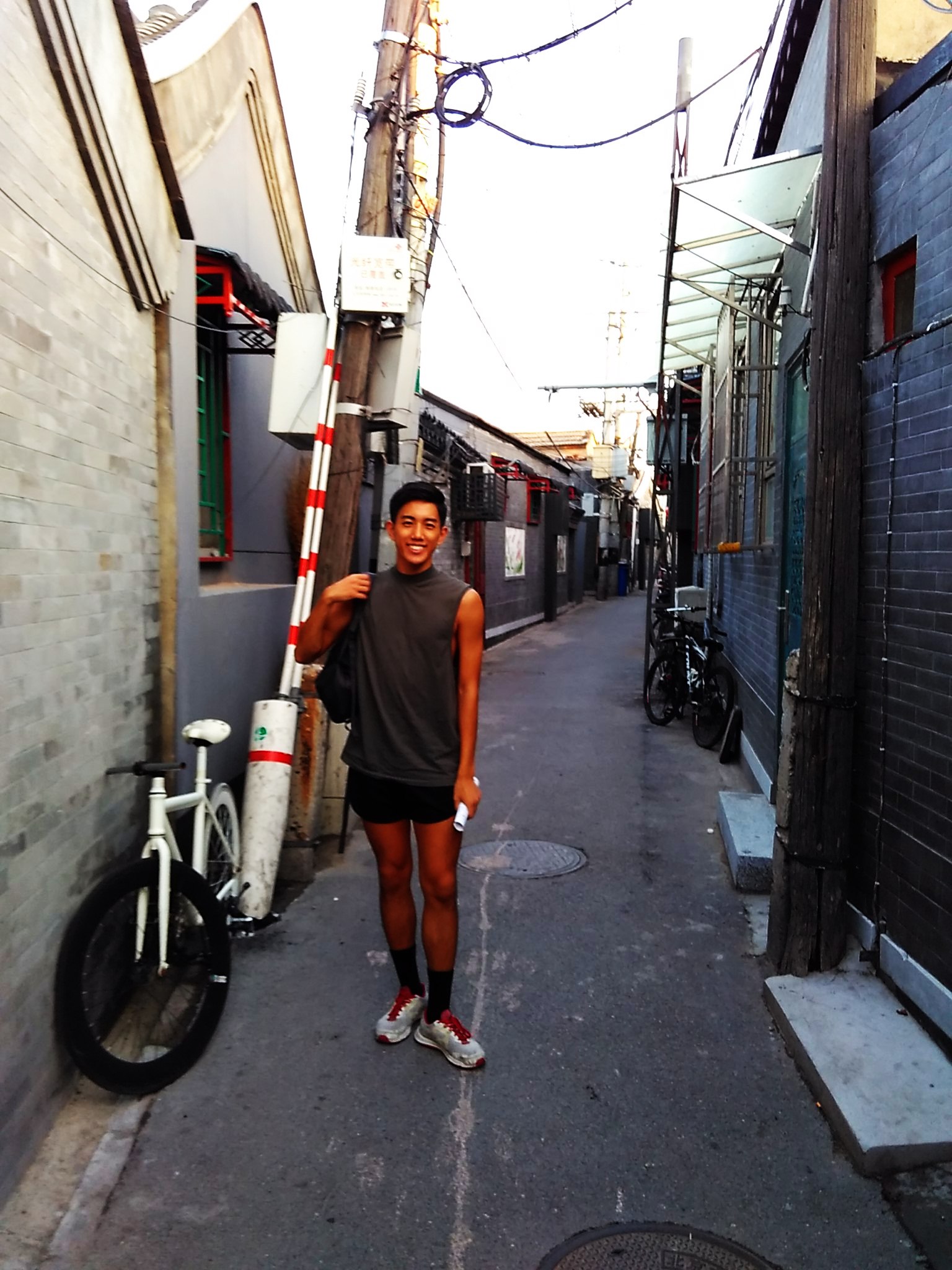
We checked in as we do, and the front desk were so unhelpful for finding a place to eat, so we decided to stroll around the old hutong and see what we could find. Once you delve past the main street, the vendors and the hubbub, you get to the real hutong. If you take a left down one street, one random street without anything in particular, you can see it come alive. Kids playing on their bicycles, men and women going home from a day's work, and old aunties walking home with their shopping. A rare glimpse past the history that we are alive to see, a small peek into what maybe it was like for that auntie or uncle when they were 5 or 6, growing up in their hutong, watching their grandchildren now do the same. For those that didn't have their wonderful courtyards sacked, they continue their life as so many of us do, and Thorin and I are so lucky to witness this. While walking around, we find a small hole in the wall, which in fact is someone's home, and they have a small sign posted out written only in Chinese that says "Dumplings." Famished from our flight, we decide to take them up on their offer.
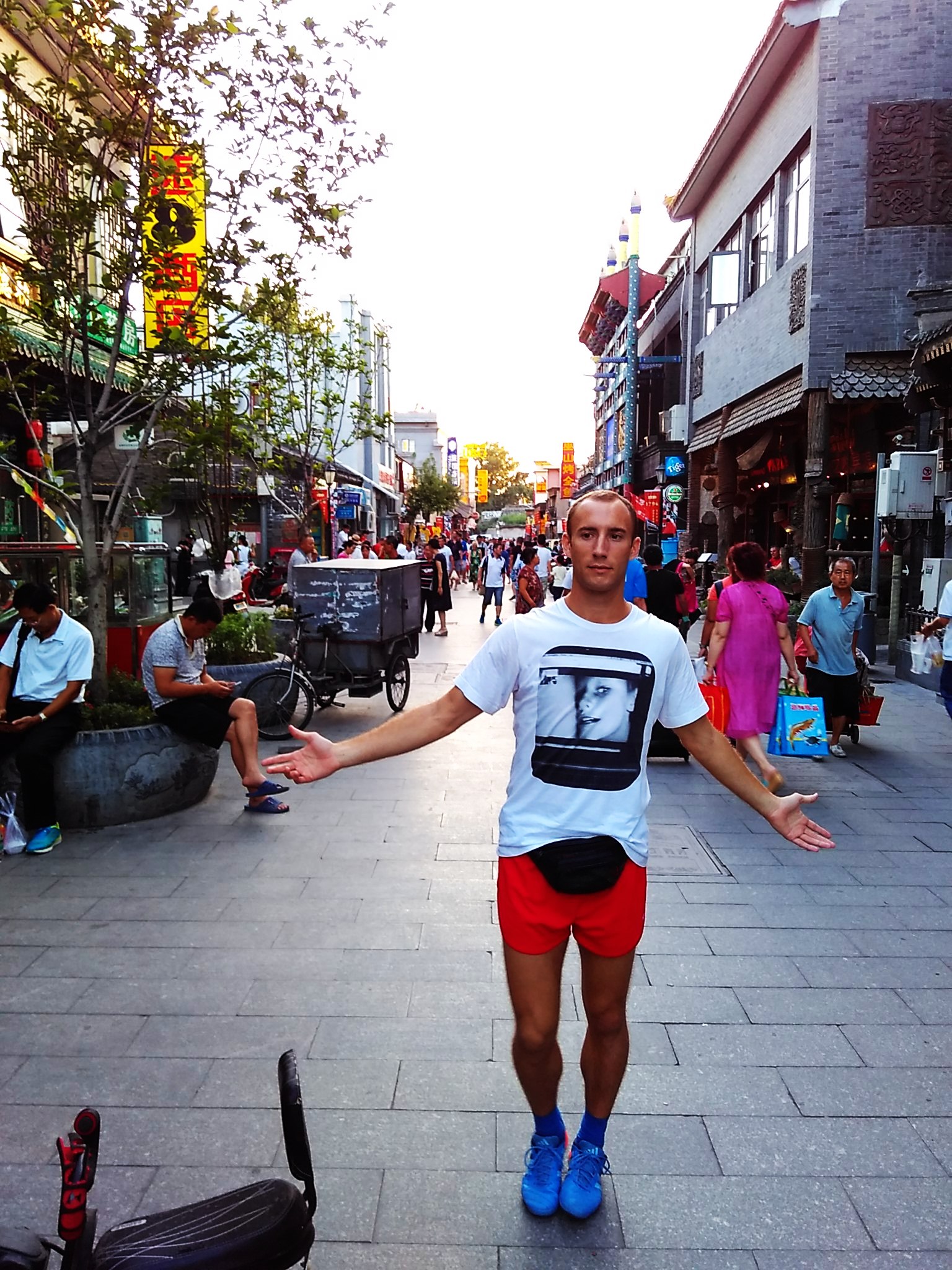
From the outside, Chinese seem like a sea of 1.4 billion people, but in reality, there's a lot more diversity here, with I think a total of 63 or 64 recognized ethnic groups. The Hui people are an ethnic group in China subscribing to the Muslim faith. They look similar to the Han Chinese, which is the dominant ethnic group and what you would think a Chinese person 'looked' like if you were to see them on the street. The only exception is they practice Islam. We sit down at this restaurant and I go to order some dumplings, and it turns out to be very family style. They have a list of meats, a list of veggies, and you are allowed to mix and match whatever kind of dumplings you want. I didn't understand this, so I tried my best to order in a broken Chinese while struggling to make it through her accented putonghua (standard Mandarin). Eventually, I get around to ordering lamb dumplings, which is something I've never tried before. We get two beers as well. The lady and her (assumed) son begin cooking just right behind us, in their kitchen. They stir the mixture and make it from scratch. They roll the dough and make it also from scratch. It was like being transported back to my house during the holiday season where, as a kid I would wrap dumplings from the mixture and skin made by my grandparents. My brother and I used to roll the dough and throw it at each other. I also used to shape it as if it were some sort of clay, quickly relieving myself of any duty of rolling dumplings. And, here was auntie and her son doing the same.
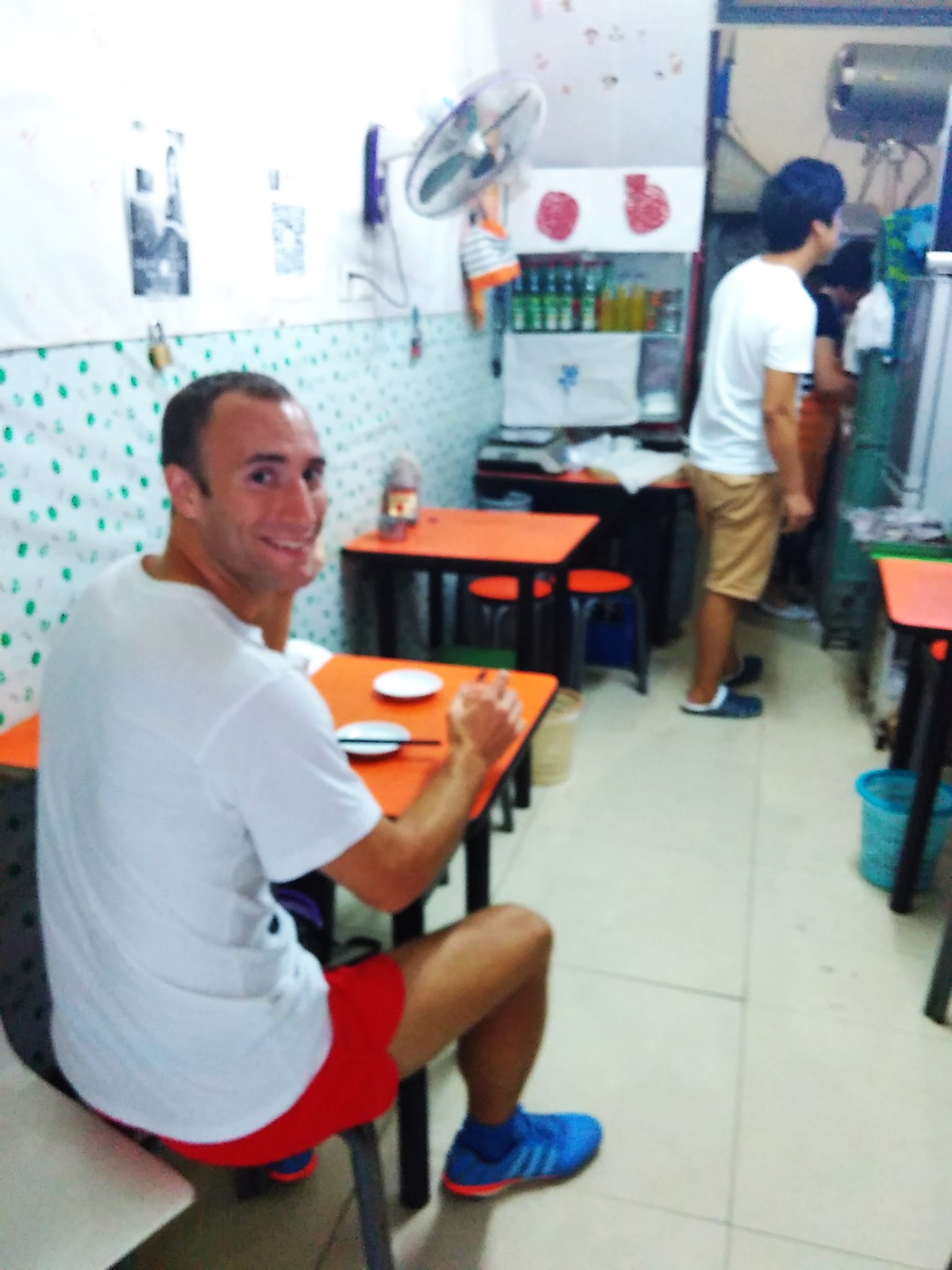
Two huge plates full of dumplings came out, more than we were expecting, but we were ravenous. Probably, some of the best dumplings I ever had. The flavor was superb, and the meat was tender, mixed perfectly with the vegetables wrapped up. At one point we had trouble finishing since we also had to stomach two Yanjing beers. But, in China it's all about face, and saving it. We finished eventually, much to the delight of the Hui Muslim folk who were just watching us eat.
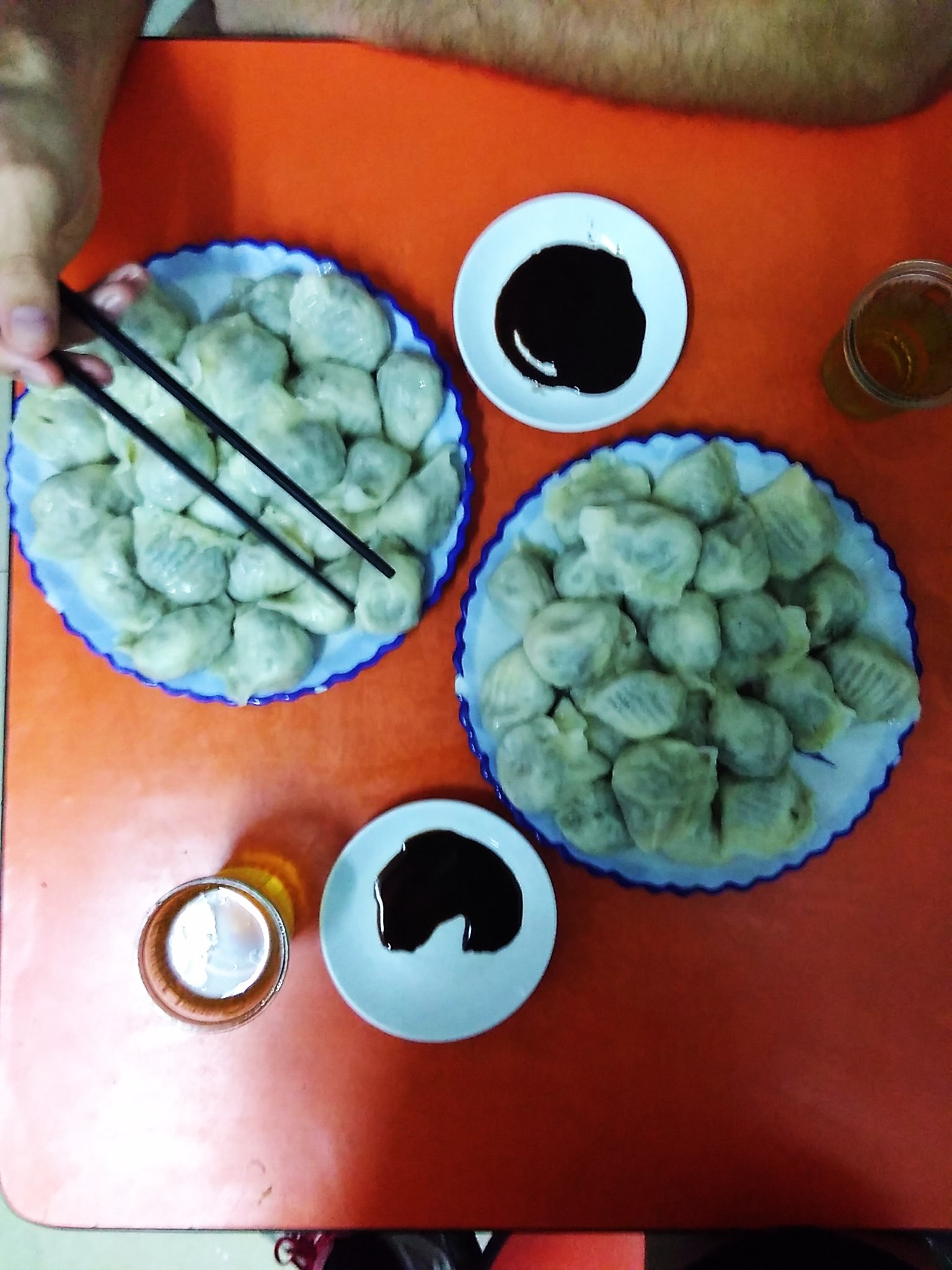
After we got out, the sun had mostly set and so we just decided to enjoy what was left of the beautiful weather to stroll around the hutong. This was probably my favorite part of the quick layover, getting lost in the aisles of the old residence quarters, admiring the old buildings as well as the new buildings made to look old, and so were built in a similar style. Laborers still working on some of the housing, and other families setting up small stands of street food and vegetables to sell. Children playing with each other in the streets. People returning from work and diving into restaurants to eat. Everywhere you looked there was something going on, but it wasn't congested. We saw a small shop that was not lit but with some workers in there preparing some flatbread, so we decided to ask them if we could buy some of their stuff. They had a sign on it that said "3 yuan" for "bread."
The weird thing was, these guys didn't look Chinese. And, when left to their own running of the shop, they didn't even speak Chinese. The language wasn't even placeable, so I assumed it was some dialect of Chinese. But, when we got the bread we realized that these men were actually Uighurs, a Muslim, Turkic-speaking people who are native to China's western region known as Xinjiang. Their presence and acceptance into Chinese society has been rather tumultuous, as they've been actually stateless for a while but happen to be captured by the Chinese national boundary of the Xinjiang area. They have a range of looks, some looking more ethnic Han, some looking more Caucasian. In particular tonight, these men had Chinese features but were different enough to look to have been mixed with some other blood. The reason the bread made us think of these guys was because what was in it. When we bit into the bread, again one of the best things we probably had on the trip, it was filled with lamb meat stewed in a delicious sauce, perfectly complement to the crispy bread on the outside. It didn't have a "Chinese food taste," rather, it reminded us more of the food you would find in Arabic regions of the world (for a gross generalization). Those hearty breads, those fresh meats, straight from the heartland of the advent of agriculture and first signs of domestication from a normally nomadic species. I'll always remember it, the first time I saw a Uighur person and not just read about them, speaking in Mandarin to me, and then quickly turning away to speak Uighur to his friends.
In and out we wound through the hutongs just taking it in. This part doesn't need some deep explanation, it was just so enjoyable. All the good food everywhere, and that weather, that perfect weather.
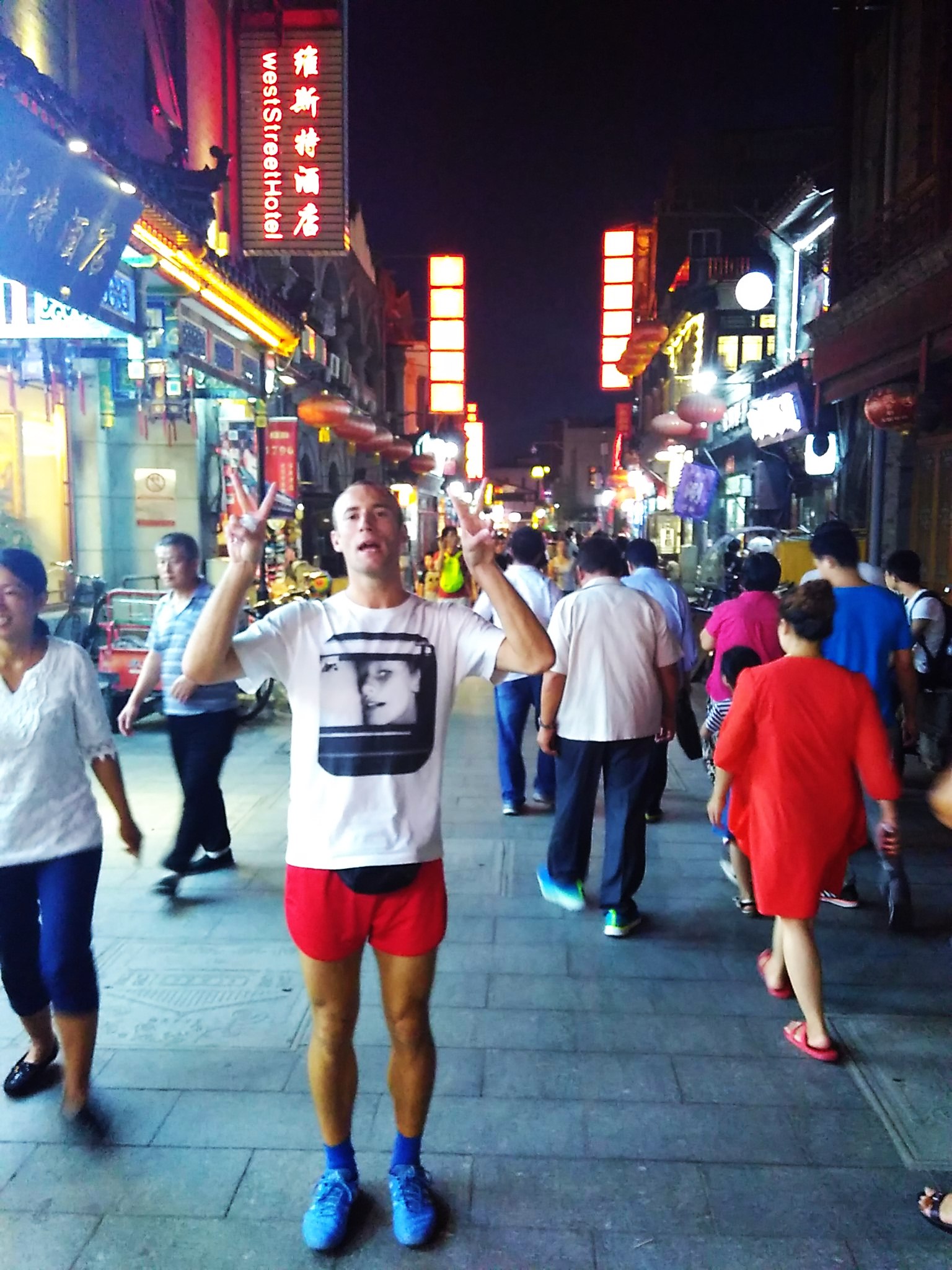
Since the dinner was so filling we thought we would walk to go see 故宫 - The Forbidden City - probably one of the hallmarks of Beijing. What we thought would take about 10 minutes to walk to ends up taking about 30 as the streets are just so expansive. Along the way we pass by Mao's mausoleum again as well as some communist party headquarter buildings, with their solid marble statues framing a perfectly rectangular building, anchored in the middle by communist stars, surrounded by guard standithe place. We finally make it to the front of the Palace, but across the street, and have to take another 10 minutes to walk around the street, walk underground, and then finally come up at the other side of the street. There's strict security of course, and then we're finally in. But, strangely enough, not a sight of a police once you get in. My suspicion is that there are plain clothes people patrolling only as to not ruin the aesthetic of this great Wonder.
We don't see many foreign tourists, but what we do see is a lot of Chinese people taking picture sand frequenting the place. Teenagers just sitting around on the steps, as well as kids playing around. When a country this big has its own wonderful structures, they don't often need to travel to the next country to experience rich culture, it's probably a plane fly away within their country borders. And so even though it was 21:00 pushing 22:00, it was buzzing with people. We just walked. And kept walking. There was so much to see but we were only here for less than 24 hours.
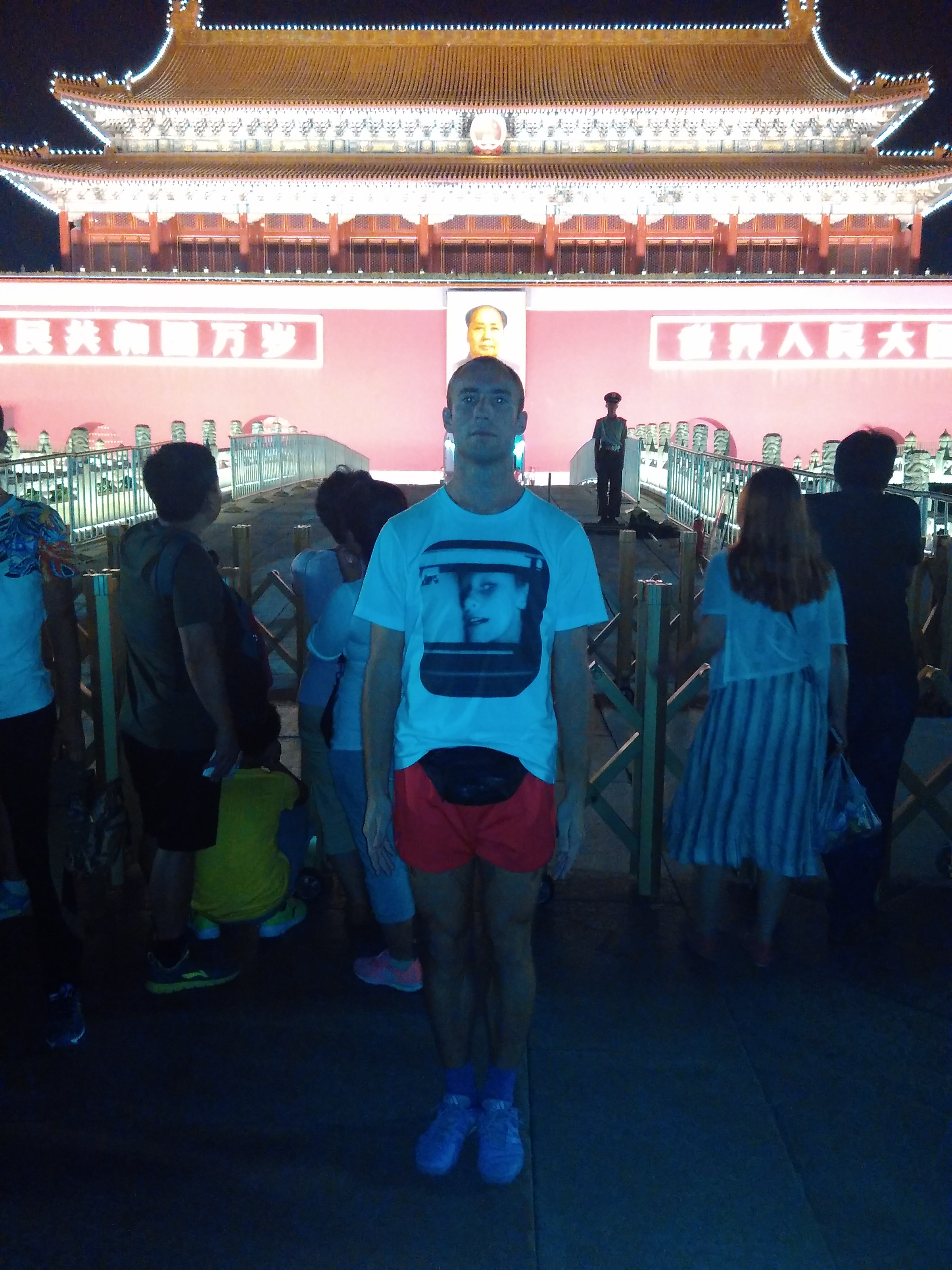
Got a Mao on my head.
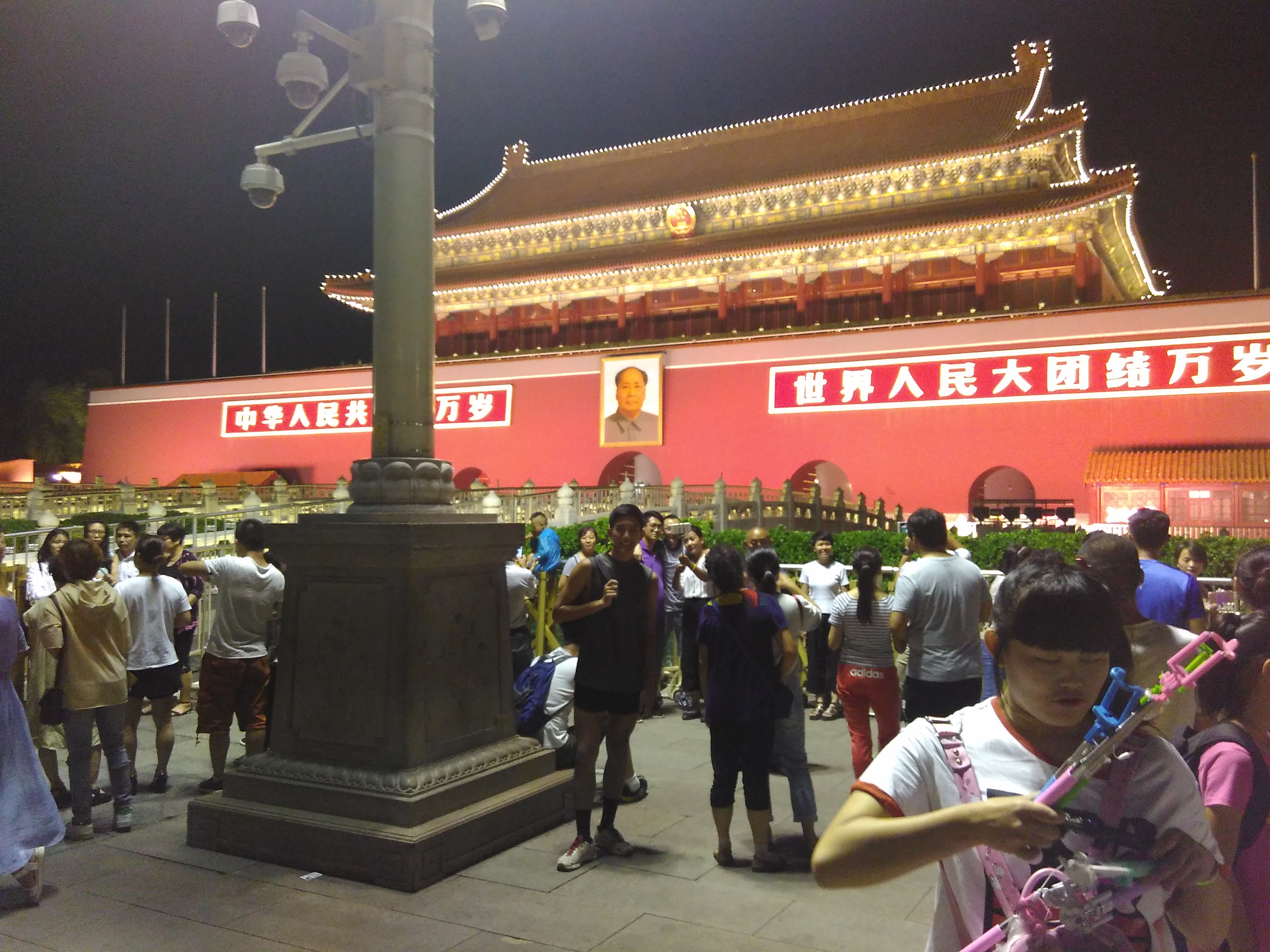
On our way back, we hit up another old street with shops and general tourist stuff, framed by a small gate.
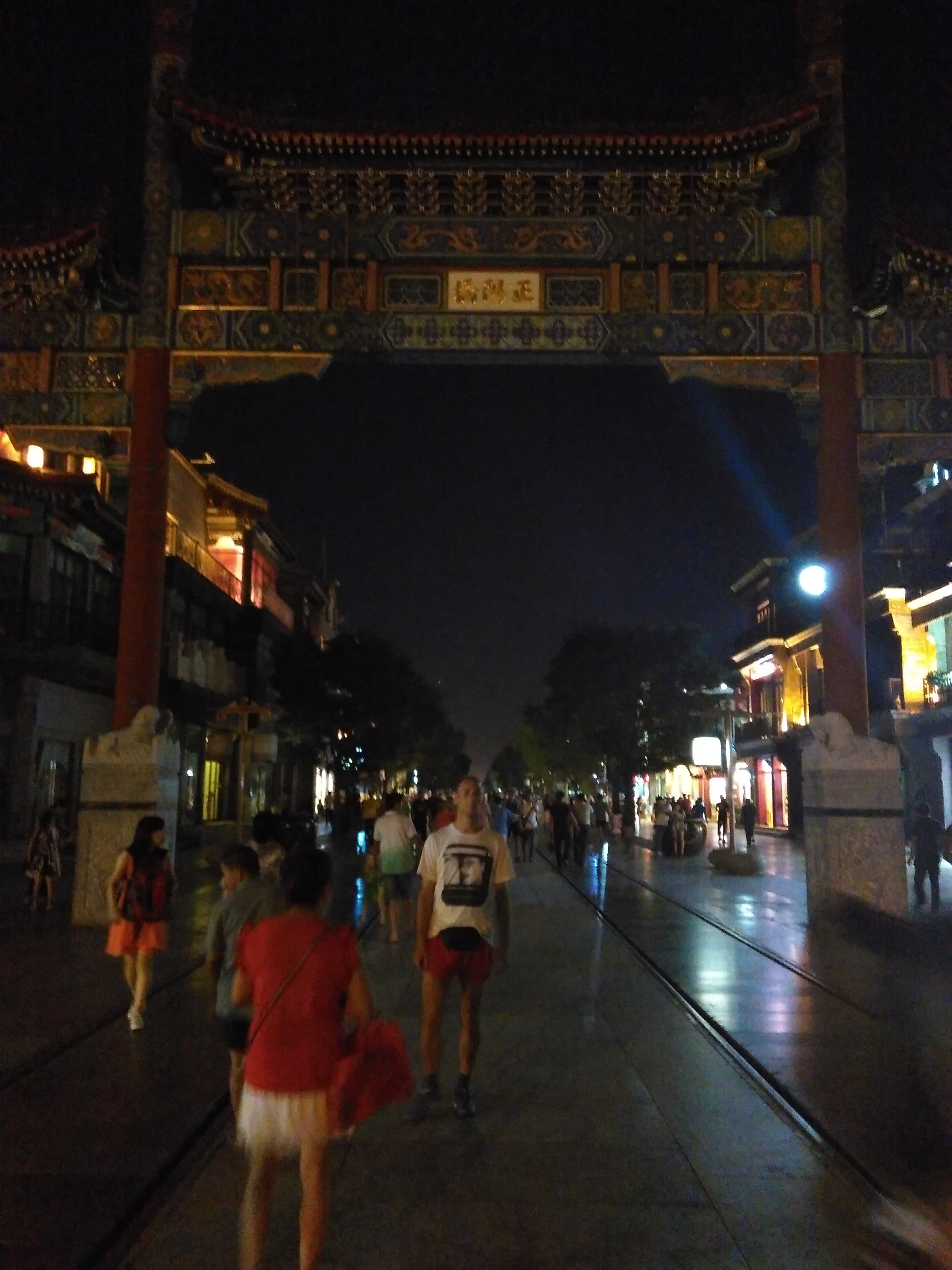
After sobering up a bit from our heavy meal, we decided to eat some more and got some yogurt drink and zhajiang noodles, which supposedly Beijing was known for. Actually, talking to some of the other Chinese people, it seems that Beijing food is actually not widely known except for the duck, which we didn't bring enough money to try. But, whatever, we were just happy to eat.
For the rest of the night, we were just walking through the old streets. As the night progressed, uncles playing Chinese Chess were out with their beers and maybe a shuffling of mahjong tiles could be heard in the background. The streets were thinning out a bit as the shops began to close, as Beijing was for us. The next morning, we walked around the hutong and found some steamed buns and dumplings on the side of the street, so we sat down and had our breakfast there. After walking around the hutong a bit more, it was time to go back to the airport and continue on on our journey. Now that our passion for China had been unearthed, we were eagerly awaiting our next trip back. This layover was just the beginning of it.
